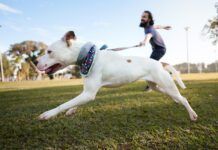The article on page 19 conveys (I hope) some very useful information about fostering a dog or puppy. Its an article I wish I had read before I embarked on my latest fostering venture. There is so much that a person should know before fostering, in fact, that there was little room to share my own fostering experience. Heres the story behind the story.
I wasnt planning on fostering; it was an impulse decision (mistake #1). I had spent all day at my local shelter, helping out during an Adopt-a-thon event that drew a crowd of potential adopters with extended hours and reduced adoption fees. I personally matched three families with appropriate dogs that day, and was feeling really good about that adoption accomplishment. At the end of the day, the shelter director and I were taking one last tour through the kennels, noting which dogs had been adopted and which remained, when we heard a staffer exclaim, Hey!
What happened? the director asked as we walked over to the run the staffer was cleaning. This dog just tried to bite me! he replied. The director and I looked at the dog in question; it was a skinny puppy, 11 weeks old, who was cringing in fear at the back of his run. Many (if not most) dogs bite when they are scared to death (as this puppy appeared), but something else about the pups expression and posture made us doubt his potential for danger. Still, a shelter cant responsibly present dogs who bite to the public. Would you mind taking that puppy into the get acquainted room and assessing him again? the director asked me.
I entered the kennel slowly, crouched low. He hid his face against the back wall and shivered. When I carefully picked him up, he made no defensive gestures whatsoever and while he wouldnt look at me, his long tail thumped against my side as I carried him to a small, quiet room.
I spent about an hour with the pup in that room. I sat on the floor quietly as he slowly smelled every inch of the floor, save for a wide circle around me. I tossed bits of hot dog to him for another 10 minutes or so, until he warily approached my outstretched hand to take one from my palm. A few minutes later, he allowed me to touch him with one hand as he took a treat from the other. When I stroked his head, he stopped chewing and briefly closed his eyes. Then, slowly, deliberately, he climbed into my lap and lay down.
So, duh, I had to finish what I started. This poor little guy was obviously undersocialized, but it seemed to me that he was a good dog. I figured Id take him for a week or two and return him as a better-socialized, confident pup whod readily attract good adopters. The shelter director had no objections and so I took him home.
The train derailed shortly afterward. The pup had a poor appetite and his energy level ebbed and waned. He developed a snotty nose and a bad cough. When drinking seemed to irritate his throat and make him cough, he stopped drinking, got dehydrated, and earned his first trip to the vet. Fluids and antibiotics perked him up for almost a week and then he got worse. He was diagnosed with pneumonia on his second trip to the vet, but just needed more subcutaneous fluids and an anti-emetic medication (for nausea) on his third visit.
Finally, I was able to get him in to see my favorite holistic vet, and we launched a multi-pronged, aggressive attack on his illness. I administered subcutaneous fluids twice a day for almost a week, until he felt good enough to drink adequate amounts of water. I also gave him daily injections of an antibiotic and an anti-nausea drug, and dropped a second antibiotic drug down his throat twice a day, until his appetite returned and I could hide them in treats. He also got colostrum mixed in an aloe distillate and probiotic treats (to stimulate better GI health, which improves immunity) and an herbal cough syrup.
The experience was totally worth the tough parts. He blossomed while he was here Otto played a huge role in his education and we found a perfect home for him. Ill share more about the pup, now named Tonka, next month.




